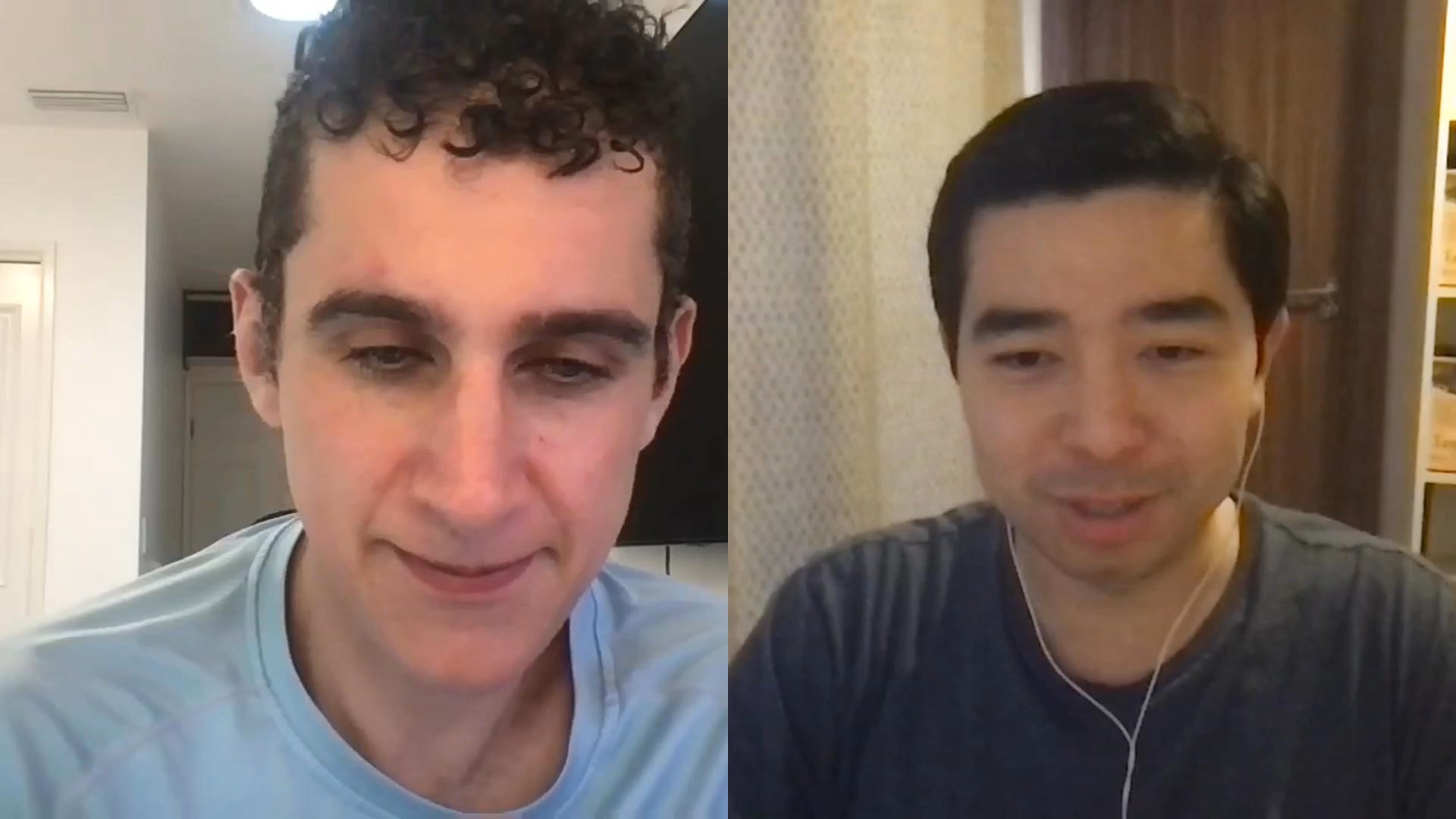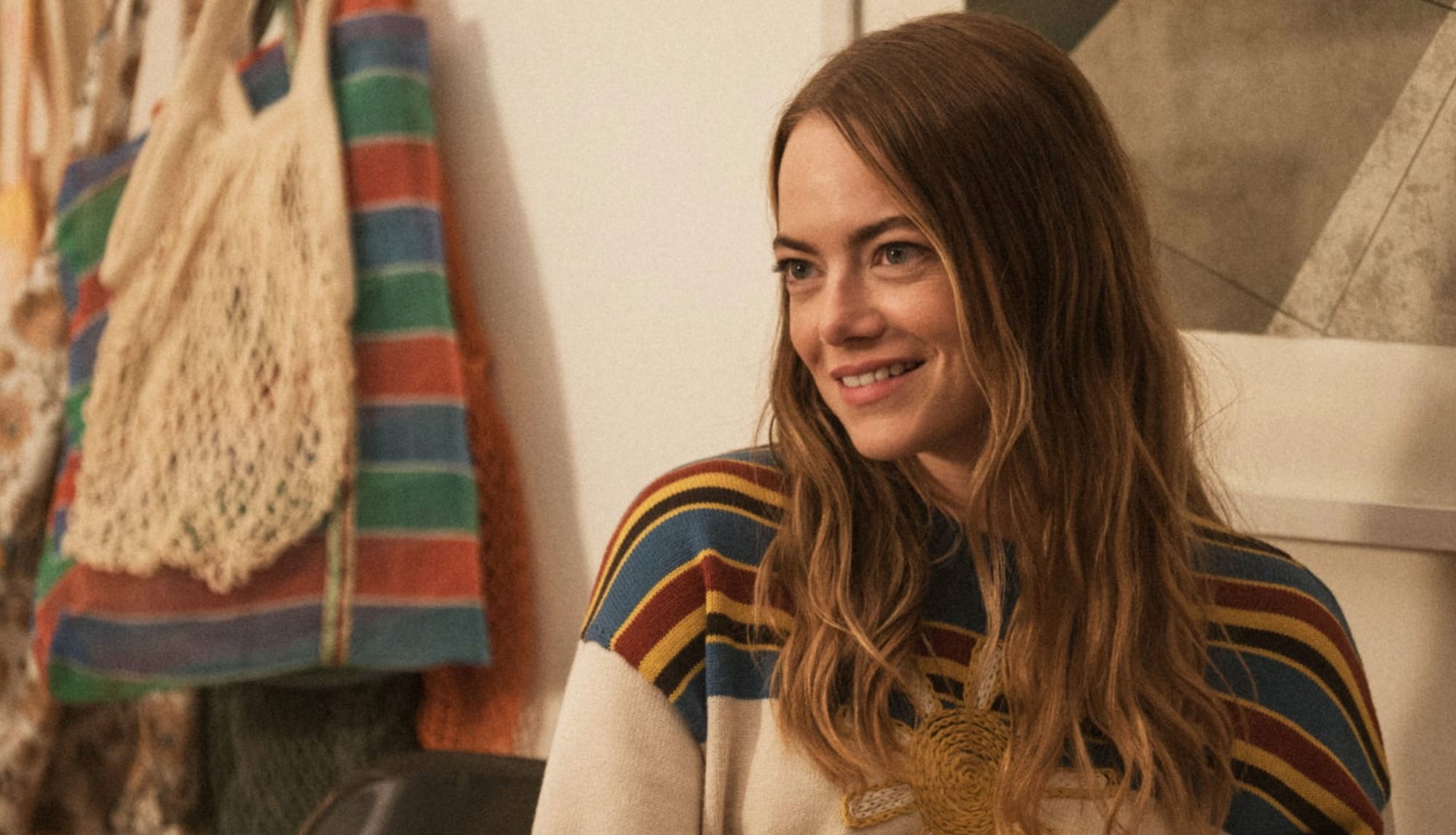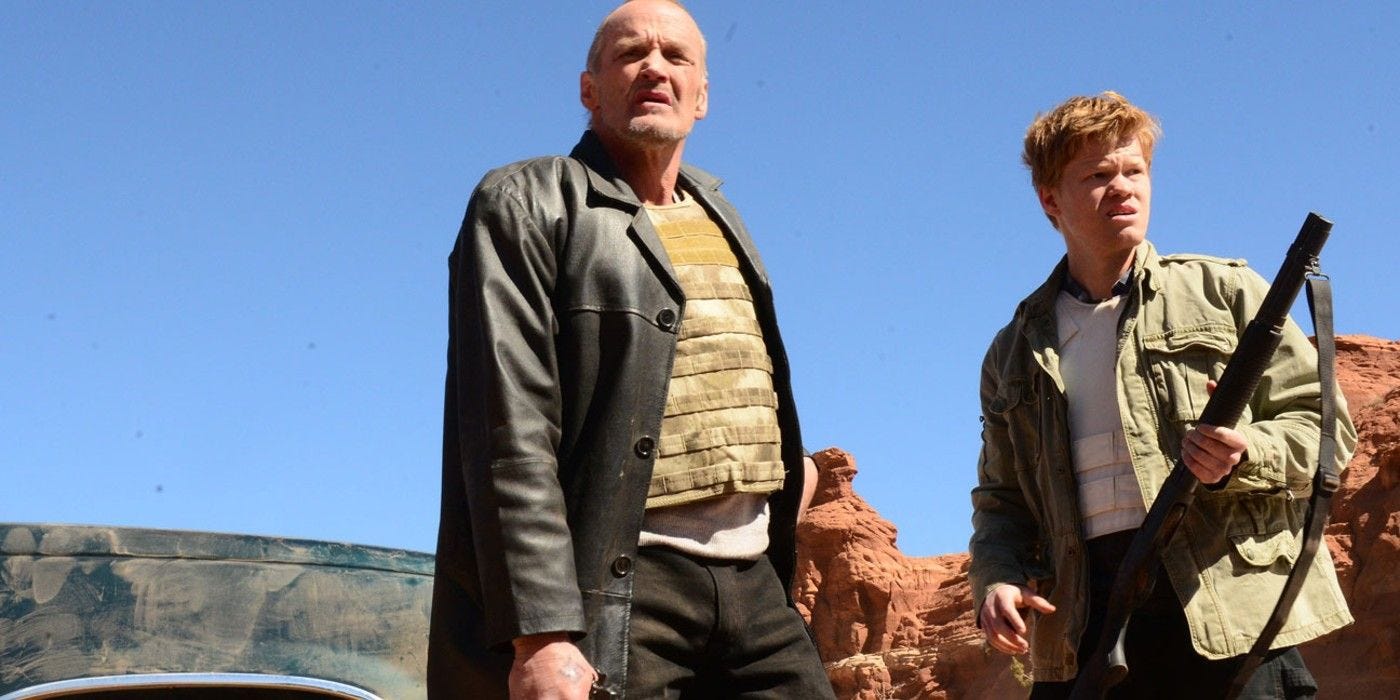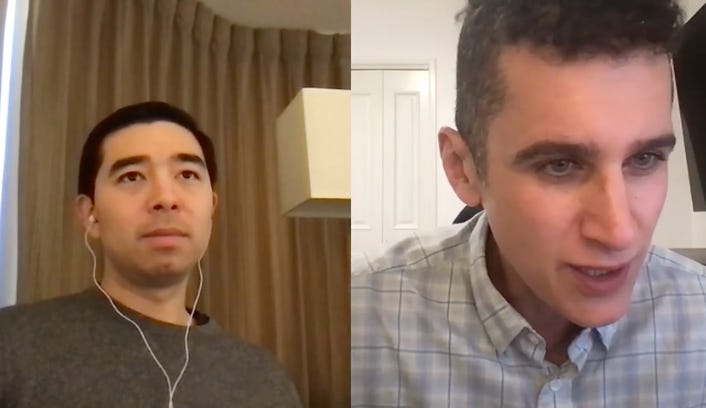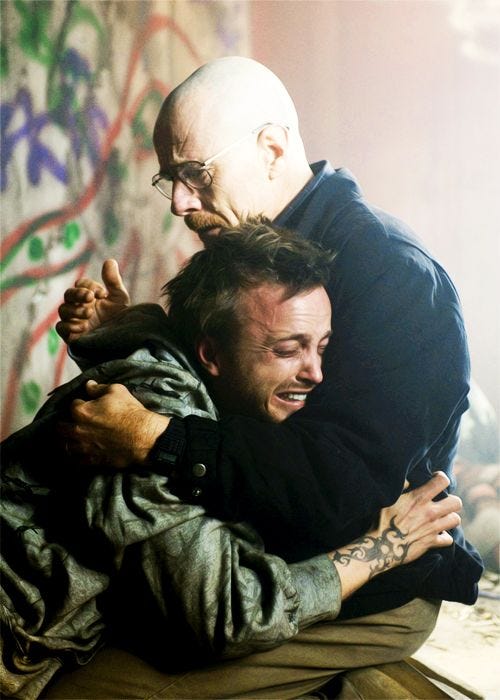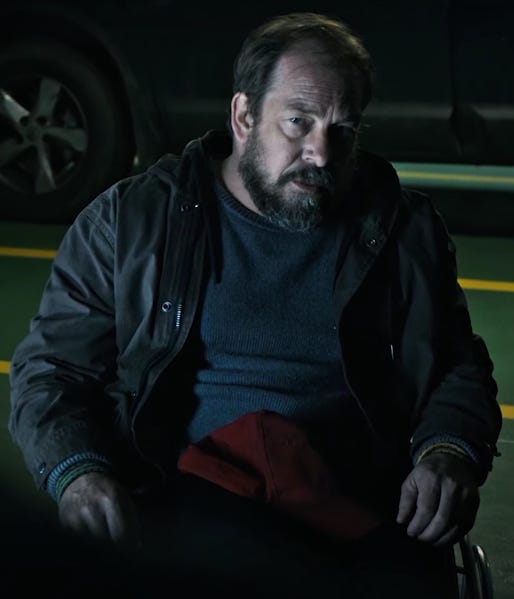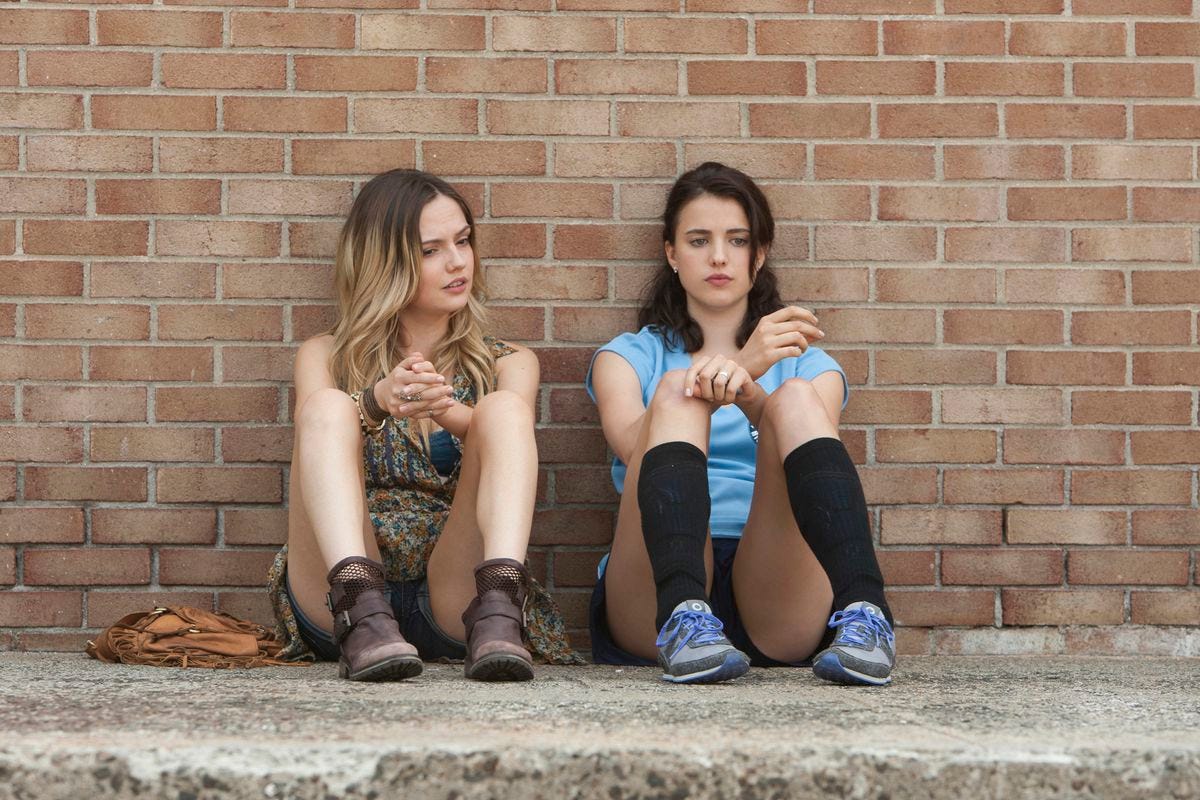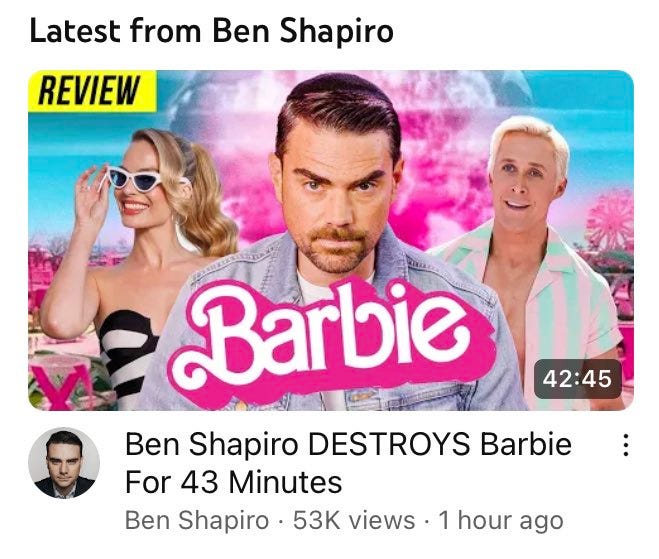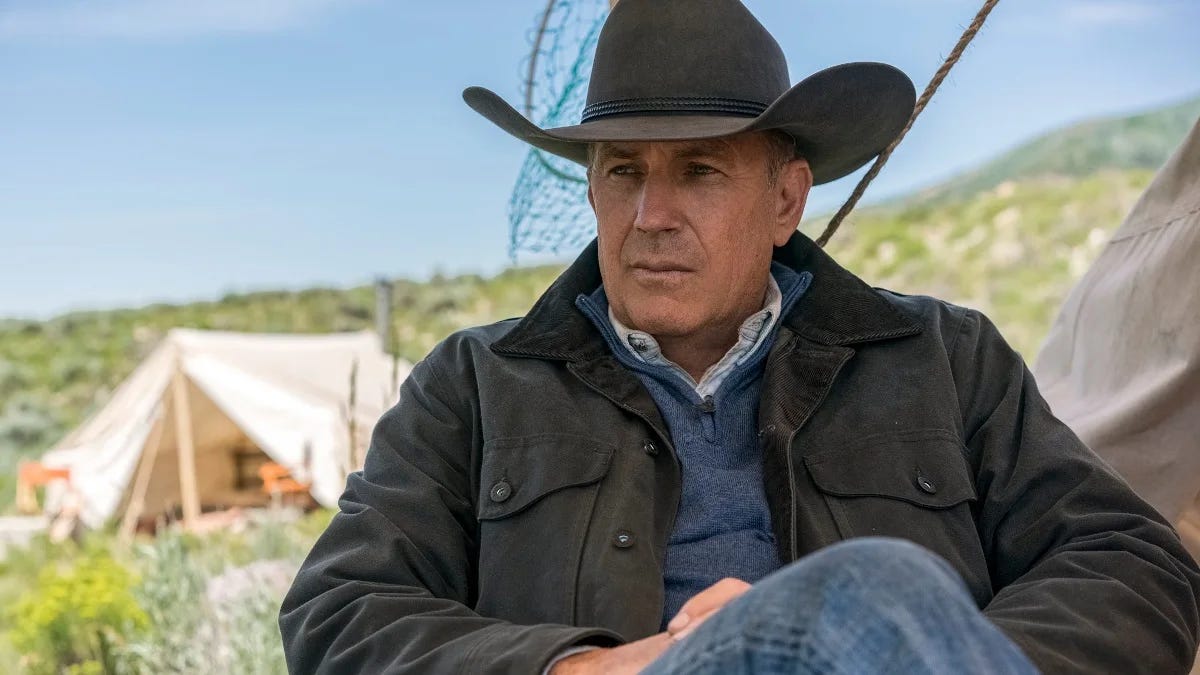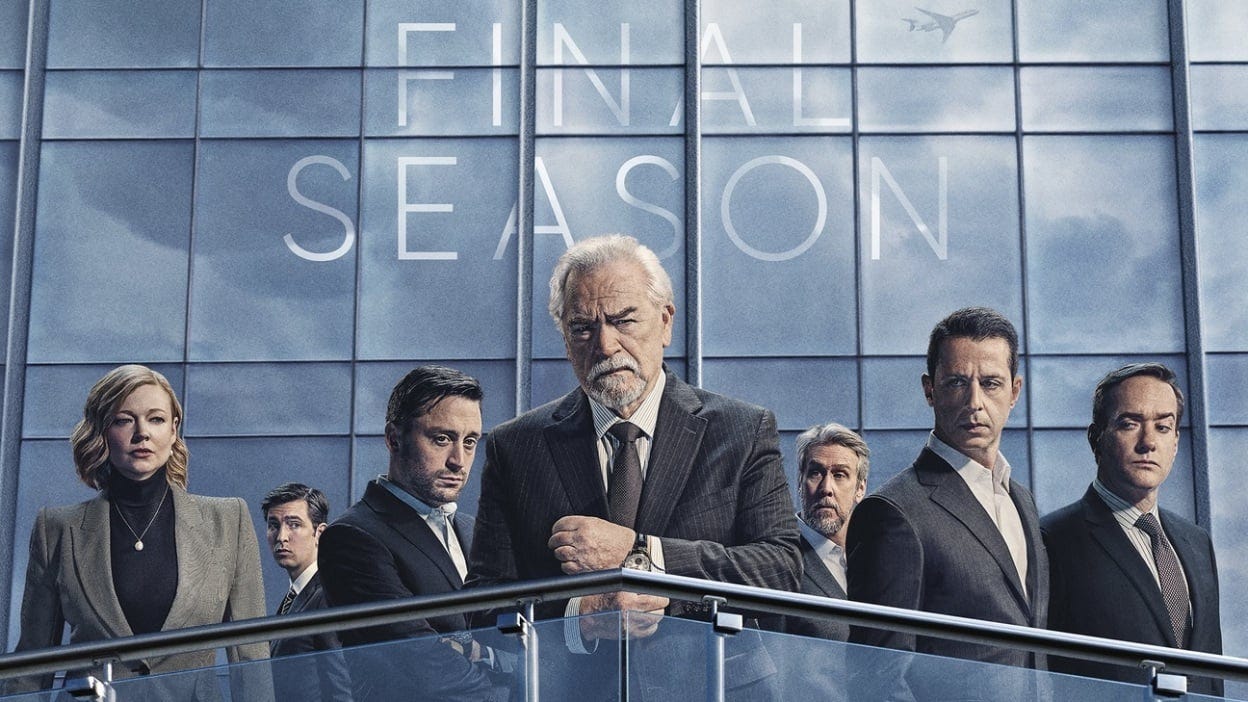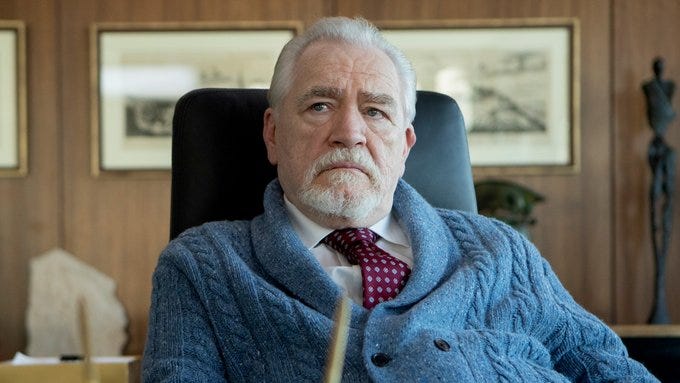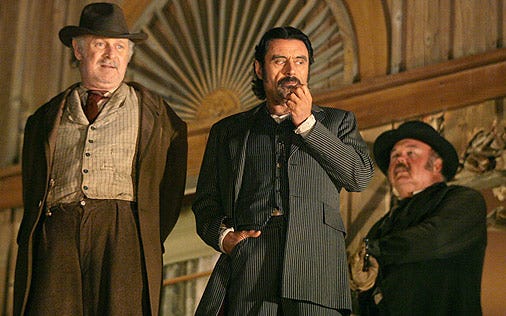Discover The H&H Podcast
The H&H Podcast

51 Episodes
Reverse
This is a free preview of a paid episode. To hear more, visit www.richardhanania.comRob joins me to talk about the film Civil War. We both have already posted (spoiler-filled) reviews. I really didn’t like it, while he gives the movie a kind of lukewarm endorsement. The greatest weakness is clearly its lack of explanation of how the US got to the point where Americans were killing each other. The movie doesn’t simply ignore the question. It goes out of its way to be unrealistic by putting California and Texas on the same side. The film is also notable for the lack of texture with which it presents American society, or whatever America is supposed to be in this alternate universe. For a sample of the conversation the film has motivated, see reviews by Tyler Cowen, Michelle Goldberg, and Ross Douthat, all of which we touch on here. We discuss different ways in which the movie is politically correct, including the lack of sexual violence. This appears to be an aspect of reality that contemporary audiences are particularly unable to handle. This ties in to larger issues about what kinds of stereotypes this film either reinforces or tries to refute.
This is a free preview of a paid episode. To hear more, visit www.richardhanania.comThe Sydney Sweeney saga continues. Rob joins me on the podcast to talk about her new film Immaculate, which I reviewed on X here. The conversation begins by Rob informing me that he thinks Sydney Sweeney is mid, and this leads to a heated debate about her appeal, which involves ranking various actresses and models over the years. We come to the conclusion that it’s a combination of her natural breasts, low class physiognomy, and nasally bored girl voice. The conversation then moves on to the film itself, its message, particularly on abortion, and Hollywood double standards when it comes to how it portrays different religions. We get sidetracked into me discussing some of my thoughts on the merits of Catholicism versus Protestantism. In the end, we didn’t find anything too deep or fascinating about the film, but it was a good 89 minutes of mindless entertainment. Listen to the audio here, or watch the video below.
This is a free preview of a paid episode. To hear more, visit www.richardhanania.comRob joins me to talk about The Curse, Season 1.Warning: spoilers in the show notes and also in the discussion. I highly recommend watching first, because it’s very good. The first nine episodes were some of the most compelling TV I’ve ever seen. I tend not to like the premise of white liberals being hypocrites. It takes aim at an easy target and is too overtly political for my taste. But this show I think puts politics in its proper place. Asher and Whitney Siegel are human beings first, virtue signallers second, which is far more common than the opposite. Their main emotional investment is in their own financial situation and personal relationships.Emma Stone as Whitney shines in her role. I couldn’t take my eyes off her. The way she uses humor to deflect tension, establish connections, and try to but not really succeed at eliminating status imbalances is captivating. She’s the most compelling version of the liberal white woman. There’s a kind of fakery that takes itself so seriously that it becomes authentic, even romantic. Rob thinks she’s a completely unsympathetic character, while I see more nuance. We observe her through the eyes of her adoring husband, who turns out to be a literal cuck. We discuss the meaning of this. I argue that Asher having a tiny penis is central to the whole story, while Rob seems to take pity on the poor man and see it all as a bit much. We also talk about my idea of there being two kinds of white liberals: those who get into Native Americans, including Hispanics, and those who get into blacks. Leftists tend to gravitate to the minority group that is most similar to them in personality. The ones who are more extroverted, risk acceptant, and into showy displays of submission like blacks better. More sensitive and subtle souls take the other path. Part of this reflects how each minority group approaches identity politics. Black Americans are more likely to lean into their role as designated victims, while Natives are sort of puzzled by the whole thing. White liberals looking to play a savior role or indulge in racial masochism pick up on these differences and choose accordingly. I was looking forward to the final episode, but ended up truly heartbroken by it. You don’t introduce arbitrary magic into a story that was so internally consistent up to that point. I remember the sinking feeling I got the exact moment I knew they ruined the show. A world that had been absurd because it stayed brutally true to the human condition suddenly became absurd due to a supernatural element. What a betrayal of the audience.
This is a free preview of a paid episode. To hear more, visit www.richardhanania.comIn previous discussions on rewatching Breaking Bad, I’ve often talked about how our minds play tricks on us. Going over the final two seasons, I was shocked by how much I had whitewashed Walter White’s character. I remember him being a somewhat complex figure near the end, when in reality he was a kind of cartoon villain. I was most amazed to realize that I had misremembered how he killed Mike. I thought it was an accident! The fact that I got something so basic wrong indicates either that I was twisting reality in my mind at the time or I’ve done so over the last decade, probably influenced by the blaze of glory through which he went out.Of course, the way Walt finally gets his revenge on the Nazis seemed ridiculous at the time, and it’s even more ridiculous in retrospect, given we were expecting that outcome and not experiencing the surprise and overwhelming awe one feels when seeing it for the first time. We also reflect on the famous jailhouse murders. I present to Chris my theory of how the Nazis seem to show a remarkable number of virtues in a way that other criminals don’t. His interpretation of the series holds that individuals are often brought down by their fatal flaws. For Hank in particular, it might have been his toxic masculinity. But for the Nazis it was actually their compassion and sense of honor that did it! What were the writers trying to tell us?Perhaps the most interesting part of our discussion is when Chris convinces me that Walt went back in the end to rescue Jesse from the Nazis. I actually hadn’t considered this, either during the original watch or this time around.I realize that this is now the twelfth conversation I’ve released on Breaking Bad or Better Call Saul. See below for the previous discussions, which are listed in chronological order, just above the video and transcript. There’s been a lot to explore in this universe, and I hope others have enjoyed this journey with us. I’m open to suggestions regarding what to watch next. The Breaking Bad UniverseBetter Call Saul: S6E7, Plan and ExecutionBetter Call Saul: S6E8, Point and ShootBetter Call Saul: S6E9, Fun and GamesNietzschean or Christian? Marc Andreessen on Breaking Bad and SaulBetter Call Saul: S6E10, NippyBetter Call Saul: S6E11, Breaking BadBetter Call Saul: S6E12, WaterworksBetter Call Saul finale with Chris and Marc AndreessenRewatching Breaking Bad, S1 and S2Rewatching Breaking Bad, S3- S4E4The transcript below is AI generated, and has not been checked for accuracy. I’ve added my own transcript because the Substack version doesn’t differentiate between speakers, which makes it seem useless to me. I hope they fix this, because it would be nicer to have actually usable transcripts integrated into another tab. But if you want to use the Substack version for whatever reason, you can.
This is a free preview of a paid episode. To hear more, visit www.richardhanania.comRob joins me on the podcast to talk about what it takes to become a writer, “public intellectual,” or however one wants to describe what we do. This conversation can serve as a guide for those who might try to follow a similar path. But even if you’re not going to be writing for a living, I think there’s still a lot you can get out of our talk, as it served as an opportunity for us to take a step back and reflect on our previous work — and really our lives — up to this point. When we got to the topic of each of our writing processes, I came to realize that we have deep differences regarding how we get motivated, and our approach to life more generally. Rob says don’t romanticize the process, while my philosophy is that romanticizing everything is the key to joy and meaning. Writing is something he occasionally has to force himself to do, while I hate taking breaks and vacations, and wish family life didn’t pull me away from working even more. Rob of course is the psychologically normal one here, and which of us you decide to take advice from is going to depend on how exactly your mind works. Ironically, in the midst of our discussion about how we get ideas, I realized that I needed to at some point write an article on my romanticize everything philosophy. This is something I have thought about before but it’s been a while since I’ve reflected on it. Other topics we cover include:* How we describe our jobs to other people* What it was like having one foot out the door of academia* How we both sort of stumbled into our current positions* The odds of actually making money at this* How to build an audience* The ways in which we use X* Internet fame as a way for single young men to find girlfriends* Avoiding audience capture* Why we were both lucky to start our newsletters around the time that we did, rather than a few years later* Dealing with book publishers and the prestige media* Why journalists, academics, and independent writers all tend to share similar characteristics* The ways in which various writers like Razib Khan, Scott Alexander, Freddie deBoer, and others have been able to make it on their own, and how their different backgrounds have contributed to their successThis ended up being one of the most inspiring conversations I’ve had in a while. It was fascinating to hear Rob’s story and invigorating to reflect on my own, and I felt a sense of overwhelming gratitude when considering just how much serendipity was needed for both of us to end up where we are.Below, you can watch the video of our discussion or read the transcript, lightly edited for clarity.
This is a free preview of a paid episode. To hear more, visit www.richardhanania.comRob joins me to talk about our experiences growing up poor, or poorish, with a focus on what race relations were like. For some context, I’m 38 and spent my childhood in one of the less nice suburbs of Chicago, while he’s 34 and was raised in rural California. Both of us mostly hung out around people who didn’t end up going to college and had prole habits, ideas, and interests. My family had some money but like many immigrants they didn’t spend it on moving to a nice school district, so I grew up with the lower-class American experience. We discuss racial tensions in our schools, whether kids we grew up with were just uncomfortable with gay people or actively hated them, dating across color lines, and much more.Over the years I’ve come to realize that everybody is in something of a bubble. When I was growing up among the proles, I had a lot of misconceptions about what those at different socioeconomic levels were like, and more educated Americans are just as clueless about those at the middle or bottom. Rob and I came of age at about the same time, in communities that were majority white and non-college educated. Nonetheless, there was a lot more anti-blackness and anti-gayness where I lived, while these attitudes appear to have been less prevalent in Red Bluff. Maybe this is a California thing, as regional differences seem to matter a lot. Our divergent experiences reflect only a slight portion of the variation that exists across the United States, as neither of us has spent time in say Appalachia or the Deep South. We tell stories about the gay kid that Rob knew who was once the only one with the courage to say the “n word,” the Muslim girl at my school who one day took off her hijab and caused the boys to lose their minds, the Christian Arab girl whose family swore to kill her if she ever slept with a boy, and Rob’s only experience with the trans movement. The first of these causes us to reflect on the 1990s and 2000s as the era of a more masculine liberalism, which joyously mocked those who felt harmed by words, whether incantations to Satan or racial slurs. Near the end, we get to wiggers versus cowboys, and how Trump has shifted the ways in which the people we grew up with see the political world. This conversation motivated me to look into what happened to the town I grew up in. It went from 1% black and 5% Hispanic in 2000, to now about 7% black and 22% Hispanic. Over 5% of households speak Arabic at home, and another 15% Spanish. I was recently back and saw signs and billboards in Arabic for the first time, and a sushi restaurant, which would’ve been a very strange sight when I was a kid. There’s something truly beautiful about demographic transitions, where those willing to reproduce and take the necessary steps to better their lives by crossing a border inherit the earth. Life is about movement. Whenever you find yourself on the opposite side of the youth, you must reconsider. Those who mourn certain aspects of the past can’t push a rewind button, but must use contemporary ideas, technologies, and institutions to try and build something new. You can watch the video or read the transcript below. Note that the transcript is AI generated and has not been checked for accuracy.
Chris joins me to go over Breaking Bad, Season 3, and the first few episodes of Season 4. I had gotten to Episode 4 of Season 4, while he had only gotten to Episode 2 of that season, so there was some confusion on this point, for which we apologize. You can listen here or on your podcast app, or watch the video below. There are spoilers in the episode and the rest of these notes. Once again, I’m blown away by how little I remembered from originally watching the show. Often, it’s the emotional coloring of a storyline that stays with me, while plot details are completely lost. But those details are very important for understanding a story, shedding light on the personalities and motivations of the characters. So I remembered Walter falling out with Gus, because I can still feel how miserable his life became under constant surveillance, but not how that happened. Hank’s injury was something that had completely dropped from my mind. I had remembered him as the guy at the beginning of the series and at the end, but forgot all of the development in between. The character who is really making an impression on me on this rewatch is Marie. She had always been something of a joke in my mind, but here you see that she is actually quite sympathetic, particularly in how she takes care of Hank after his injury and doesn’t get discouraged regardless of how bad he treats her. On the main storyline, I’m taken aback by how much Jesse really screws Walt. There were a few times when Walt was in a position to simply continue making money and being on good terms with Gus, but Jesse ruins things with his emotional instability, drug addiction, and irrational pride. We discuss why Walter continues saving him, and come to the conclusion that he just cared about Jesse, making Breaking Bad in its essence a true love story. On this point, see Mike’s Half Measures speech.One thing we thought was interesting was that Gail Betteker may have been the only character in the entire Breaking Bad universe to ever express a political ideology. We discuss the significance of this, and the role he played in Walt’s larger story.Here’s the video of our discussion. For previous conversations on Breaking Bad and Better Call Saul, see the links below. All the discussions are between me and Chris, except where Marc Andreessen joins us, as noted. They are listed in chronological order.The Breaking Bad UniverseBetter Call Saul: S6E7, Plan and ExecutionBetter Call Saul: S6E8, Point and ShootBetter Call Saul: S6E9, Fun and GamesNietzschean or Christian? Marc Andreessen on Breaking Bad and SaulBetter Call Saul: S6E10, NippyBetter Call Saul: S6E11, Breaking BadBetter Call Saul: S6E12, WaterworksBetter Call Saul finale with Chris and Marc AndreessenRewatching Breaking Bad, S1 and S2 Get full access to Richard Hanania's Newsletter at www.richardhanania.com/subscribe
Rob joins me to talk about the last season of The Leftovers. For previous discussions, see here and here.We’ve changed the name of our show to The H&H Podcast. I had come to dislike the previous “dissident” kind of theme, which doesn’t really reflect the way I see the world anymore, nor is it much related to what the show actually is. We have basically been over most of the topics discussed in this episode (spoilers in the rest of the description). The show seemed like it was on the road to not offering us closure, and we didn’t get any. I think it could’ve ended after Season 2 and nothing would have been lost. The major question at the end of Season 3 is whether Nora is telling the truth, and we debate the two sides of the issue. Rob convinces me that she was lying, which makes the whole thing even sadder.The conversation naturally branches off into other topics, including whether this is a smart show or for dumb people, what that actually means, how women sexually assaulting men is portrayed in fiction versus the opposite, whether the inability of people to move on in the show is realistic, and much more. At the end we foreshadow a future discussion we hope to have on the new Napoleon movie. Get full access to Richard Hanania's Newsletter at www.richardhanania.com/subscribe
Rob joins me for a discussion of The Leftovers, up to the end of Season 3, Episode 3. If you’re following along, there will be spoilers based on how far we have gone, as there will be in the rest of these show notes. See here for Season 1. We both think Season 2 was quite compelling, but the show has really declined as time has gone on. There’s a tension in that this is clearly a world where the supernatural exists, but a recurring theme is that people keep trying to find patterns in random events. Which is it? It seems to be a world of miracles but without larger purpose. We also again go into this show being a kind of throwback to an earlier era. Things that seem to mostly not exist in this universe include Hispanics, gay people, Asians who aren’t girls in some black guy’s sex cult, political partisanship, non-Christian religions, geopolitical competition, and racial politics, or even racism. My main complaint is that there hasn’t been much progression towards some kind of explanation regarding the central mystery of the show, nor many of the small ones for that matter. Rob agrees, but seems much less bothered by this. He informs me that there are only five episodes left, so we’ll see if we get to any sort of satisfying conclusion. It’s hard to see it, but I may be surprised. The show started out with a lot of promise and provoked some interesting questions, but now it’s repetitive, stagnant, and in a sense pointless. My interest in checking out the last few episodes is largely based on a belief that there’s no way it can go on like this. Get full access to Richard Hanania's Newsletter at www.richardhanania.com/subscribe
Rob Henderson joins me to discuss Season 1 of The Leftovers, an HBO series that ran for three seasons between 2014-2017. Our conversation revolves around two main themes. First, whether this is a Christian show, or maybe as Christian a show as you can expect from HBO. We discuss subtle pro-life propaganda, and how it portrays family life. Second, we connect the plot of The Leftovers to what happened in the aftermath of covid-19. Like in the pandemic, in this show a substantial part of the population is no longer with us, and we talk about the similarities and differences between this fictional universe and actual events. It’s an interesting question what would happen if 2% of the population just vanished. I frankly don’t know how society would behave. It seems plausible to me that we’d see something like what happens in this show, where people have a day of remembrance for their missing “heroes” and otherwise go on with their lives. Or I could imagine mass panic and political and social instability. This is what makes the show interesting. Other topics include:* The portrayal of small town America* Racial tropes used in the construction of the Holy Wayne character* The Lolita storyline, and how it has disappeared from popular culture* Age gaps between men and women, the lack of them here, and how much better Kevin Garvey looks than his wifeExpect a future podcast to go through Season 3, Episode 3, and then another to finish off the series. Get full access to Richard Hanania's Newsletter at www.richardhanania.com/subscribe
Chris Nicholson joins me to talk about Breaking Bad, Seasons 1 and 2, which we both recently rewatched for the first time in over a decade.The entire experience helped demonstrate to us the fallibility of memory. It’s not like this was a forgettable series. Breaking Bad was among the most memorable shows that either of us had ever seen. Yet after a decade, while we remembered major developments like certain death scenes and the ultimate fates of the main characters, many strings that tie together various aspects of the plot had been lost to both of us.Fair warning: the conversation includes spoilers about Season 1 and Season 2. We also didn’t go out of our way to avoid spoilers for later seasons of Breaking Bad or the entirety of Better Call Saul, although, as it turned out, we didn’t reveal many of them. If you haven’t seen Saul yet, you can listen to this conversation and rest pretty easy knowing that there aren’t any major spoilers. Even if you’ve only seen Season 1 and Season 2 of Breaking Bad but not Seasons 3-5, I don’t think there are many points in the discussion where we explicitly mention what happened in later episodes, so you may be able to enjoy this podcast without having the rest of the series ruined. What struck me most about Season 1 is how we can understand Walt as a conscientious objector to therapy culture. I had forgotten his initial decision not to proceed with cancer treatment. He wanted to simply die and be done with it, and his greatest fears involved being pitied or taken care of by others. And, in light of all that subsequently happened, could it not be argued that he was correct all along? Think about all the lives that could’ve been saved if they had left the man alone!In my view, Walt shows himself to be something of a misanthrope, at least if we understand his character from a more feminine perspective. He only seems truly happy when focusing on some technical or scientific issue — installing a new water tank, cooking meth, building a new battery from scratch, etc. It’s in these moments alone that he’s able to bond with other people, either over a shared interest or by being able to explain to them some aspect of how the world works. An extreme version of the object-focused male mind, in contrast to people-focused female traits. Throughout the series we see the recurring themes of childlike wonder and the love of science that are commonly associated in our culture with figures like Bill Nye and Neil deGrasse Tyson, but without the liberal preaching. Chris brings up the hostility of fans towards Skyler, and he’s correct it doesn’t make sense from the perspective of Christian morality. But from another view, she’s doing her best to impose her female instincts onto him: try to live as long as possible, don’t worry about being a burden on others or depending on their charity, don’t cook meth if it’s against the law. This can easily be seen as a story of toxic masculinity. The protagonist would rather burn the world down than sacrifice his pride. That’s what our heads say, but the fan reaction to Skyler and sympathy for Walt show that the heart feels differently. At first glance, it’s Hank who represents toxic masculinity, but scratch beneath the surface and, as Ross Douthat pointed out, he’s the hero of the show. It’s the same thing that we see in Better Call Saul, where the more likable characters aren’t necessarily the most morally upstanding. Chris pointed out some things that I hadn’t noticed about Hank, namely how he went out of his way to keep the peace by clamping down on the perception that he was unmanning Walt. In this context, we discuss all the intricacies of the scene where Walt forces his son to keep drinking by the pool. Another part of our conversation focuses on the relationship between Walt and Jesse. Chris presents the theory that Walt keeps his protege around because he likes teaching him, and they have a kind of father-son relationship. I think that’s right, and we reflect on the younger man’s fundamental decency. I tend more towards the view that this is something of an abusive relationship, in that Jesse keeps wanting to get out of the game while Walt drags him back in.One thing that became clearer to me on the rewatch was how it could be plausible that Walt would go from being this passive high school teacher to a drug kingpin practically overnight. I recall a flashback to the Gray Matter days, where he seems like a different man. Instead of Walt being a square his whole life and then suddenly transforming into Heisenberg, it might be that his previous experiences with Gretchen and Elliot crushed him, and getting cancer simply brought out the more risk acceptant and masculine traits that had been suppressed by years of disappointment. Other topics touched on include whether Walt resents his son, the romance between Jesse and Jane, Jane’s father as another one of those stand-ins for decent normies everywhere, and the extent to which the Saul Goodman we see in the show is recognizable from the end of Better Call Saul. The conversation goes to almost two hours, so we cover a lot of ground. From now on, we’ll be doing one episode for each of the final three seasons. For previous conversations on Breaking Bad and Better Call Saul, see the links below. All the discussions are between me and Chris, except where Marc Andreessen joins us, as noted. They are listed in chronological order.The Breaking Bad UniverseBetter Call Saul: S6E7, Plan and ExecutionBetter Call Saul: S6E8, Point and ShootBetter Call Saul: S6E9, Fun and GamesNietzschean or Christian? Marc Andreessen on Breaking Bad and SaulBetter Call Saul: S6E10, NippyBetter Call Saul: S6E11, Breaking BadBetter Call Saul: S6E12, WaterworksBetter Call Saul finale with Chris and Marc Andreessen Get full access to Richard Hanania's Newsletter at www.richardhanania.com/subscribe
I first heard of the movie Blackboard Jungle while reading Derek Thompson’s Hit Makers: The Science of Popularity in an Age of Distraction. The film is most remembered today for opening with the song Rock Around the Clock by Bill Haley & His Comets, which set off the rock and roll revolution and everything that came after it. Blackboard Jungle is a story mostly told through the perspective of an inner-city teacher named Richard Dadier, and serves as a way to showcase what at the time was considered urban dysfunction among teenage boys. Here’s how Thompson describes the significance of the film and its opening track.“The breakout success of ‘Rock Around the Clock’ had everything to do with its placement at the beginning of the film Blackboard Jungle,” said Jim Dawson, author of Rock Around the Clock: The Record That Started the Rock Revolution. The reaction to Blackboard Jungle was something like hysteria — not just among teenagers, but also among their parents and politicians. Kids danced in the aisles of movie theaters and blasted the song from their cars. On May 17 1955, the Philadelphia Inquirer reported that Princeton University dorms held a competition to play the song as loudly as possible from their rooms. Around midnight, the students emptied into the quads, set fires to trashcans, and chanted up and down the streets. Meanwhile, several major American cities censored the film. The mayor of Memphis forbade teenagers to see it, while Atlanta tried to ban the movie after an alderman’s wife said it threatened the “peace, health, morals, and good order of this city.”Just as l’affaire Caillebotte consecrated impressionism through scandal in the 1890s, Blackboard Jungle’s notoriety promoted its opening track, unleashing the rock-and-roll genre. On July 2, 1955, three months after Blackboard Jungle debuted, “Rock Around the Clock” became the top-selling single in the country and the first song called “rock ’n’ roll” to reach number one on the Billboard charts, ultimately selling more physical copies than any song by Elvis Presley, the Beatles, Madonna, or Michael Jackson.One of the laws of chaos is that a microscopic change in the present trajectory can lead to wildly different future outcomes; the Brazilian butterfly shakes her wings, and a Pacific typhoon forms off the coast of Indonesia. The most popular melodies of 1954 and 1955 were dulcet waltzes next to the high-tempo hits of the later 1950s. Billboard’s number one songs before and after “Rock Around the Clock” were the schmaltzy “Unchained Melody” and the minstrel ballad “Yellow Rose of Texas,” which sounds like it could have been written in the 1850s.Could what’s implied here possibly be true? That one song placed at the start of one film changed everything about music and ultimately led to a seismic shift in American culture, with implications for everything from education and crime to family formation? The possibility boggles the mind, but I can’t totally dismiss the idea. One thing I knew for sure after reading the passage above was that I needed to see this movie.After tackling some deep questions about the causes of historical events and how contingent they might be, Rob and I focus on how race and gender issues are portrayed in the movie. On race, the film seems practically modern. Some themes and tropes that wouldn’t have been out of place in the 1990s or 2000s include: the middle-class professional being horrified at being accused of racism; the black kid having a good heart while only the white kid can be portrayed as pure evil; and the way that racial differences are downplayed in a social context. This last point is particularly striking, as a group of lower-class white boys has no racial consciousness at all, and for all practical purposes the young men treat their black and Hispanic classmates like they do anyone else. When it comes to relations between the sexes, however, one sees the 1950s as a completely different universe. It is considered completely normal for the main female character to care primarily about her looks and keeping her husband happy. Overall, we see a great deal of stagnation in American culture on race, alongside radical changes in how men and women relate to one another. While the movie’s portrayal of male-female relations lines up with popular propaganda about the 1950s, I found myself shocked at the difference between how that decade is commonly described and what was shown in this film. Surely, movies don’t perfectly reflect reality, but the fact that this particular representation of race relations was plausible to an audience of that time is surely worth noting. This experience has made both of us to want to watch other old films in order to have a more direct understanding of the cultures of past eras. Very little can be simply taken for granted.Listen here or watch on YouTube. Get full access to Richard Hanania's Newsletter at www.richardhanania.com/subscribe
I’ve posted a two part review of Barbie on Twitter, and a review of Oppenheimer. As I explain in the Oppenheimer review, it feels wrong to pair them, given the transcendent importance of that film and the silliness of its “rival.”That being said, Rob and I have been thinking about both, and we’re here to entertain you, so we’re discussing them together. My Oppenheimer review nonetheless makes it clear that if you’re going to see one film, it should be that one. Here’s an excerpt.I was not excited learning that Oppenheimer was going to be three hours long. No matter what the subject, that’s a long time to be sitting in the theater. I also wondered how Christopher Nolan could do the subject justice on the big screen. The scale and importance of World War II boggles the mind. A nearly endless list of larger than life figures. In the realm of politics, Hitler, Churchill, Roosevelt, Stalin, Mussolini. Clashes of great ideologies. At the same time, you had some of the most influential figures in the history of physics working together as part of the war effort on a weapon that would change geopolitics forever. Despite all this, Nolan meets the challenge. Brilliant use of light, sound, explosions, as cut-in scenes, both to literally simulate the effect of the atomic bomb and as metaphors to reflect Oppenheimer’s tortured psychology. The film needs to be seen on the big screen to get the full experience. The characters are deep and compelling. There were many ways that the discussions about scientific concepts could’ve gone wrong, either too technical to show off the producer’s brilliance or too dumbed down to the point where it’s annoying. The script struck the right balance. The film remains exciting throughout the three hours. Given the brilliance of the end result, it was only fitting that WWII and the atomic bomb received a treatment that was long enough to feel commensurate with the importance of the subject.As for messaging, the commentary I’ve seen assumes that Nolan is trying to make Oppenheimer into a sympathetic character, a victim of McCarthyism, and give the message that communist espionage was no big deal. I have no idea what film these people saw. As the viewer finds out, Soviet espionage was real, and all of those who worried about spying in the Manhattan Project were obviously correct! From the perspective of the omniscient viewer, we know that Oppenheimer was not a spy (although in real life who knows), but he’s constantly showing bad judgment, by sleeping with women who are either his friends’ wives or communists, and giving up his infant son to his communist friends because he and his wife were sick of the baby’s crying. The hero of the film is midcentury American society. The system works. It makes use of Oppenheimer's talents to win WWII, and then discards him, after a fair hearing, when he becomes an annoying primadonna after the war, as he seeks policy influence that his ego and awful judgment make him clearly unqualified for. The film makes you think it's going in the direction of a standard Hollywood sob story about McCarthyism. But those deciding on Oppenheimer's security clearance actually use good investigative procedures to get to the truth, and know that he's a loyal American. They tell him that, but also that he can't be trusted because he has awful judgment. And how can anyone think they're wrong?..I was tempted to talk a bit about Barbie, but it feels silly to spend too much time on it, just because they happened to be released on the same day. History will always remember WWII and the creation of the atom bomb, as it will Chris Nolan for giving us Oppenheimer.Do read the whole review. It’s up to over 200K views as of this writing, although that’s behind my review of Barbie, at over 500K, reflecting the relative success of each film at the box office.Upon reviewing Barbie, some rando academic responded that I was just doing the conservative thing of trying to find something to be mad at. My response was au contraire, I actually wanted to distinguish myself from conservative influencers who tend to have more predictable cultural takes. Before seeing the movie, people had shared with me this thumbnail, which struck me as ridiculous.A few years ago, someone made a movie about Blue State elites hunting Red Staters, and right wingers got it cancelled based on the theory that it was attacking them, when they were actually supposed to be the good guys. So conservatives are often not the most sophisticated art critics. It’s also worth mentioning that this movie was heavily promoted and became a cultural phenomenon even before its release, and I liked the idea of moving back towards a country where blockbuster films serve as Schelling Points for the larger culture. Barbie being good would’ve let me both differentiate myself from less sophisticated conservatives, and also appreciate a work of art that could represent a healthy trend, away from endless remakes of movies and back towards widely successful original storytelling. But intellectual honesty compels me to tell the truth. Ben Shapiro was right. This movie was awful, both in terms of politics and of character and plot development. The trailer, which had given me hope, turned out to be a bait and switch on the audience. Shapiro’s review is in parts goofy, like when he complains about masturbation jokes, but most of his critiques are completely correct.But that doesn’t mean we should despair at the kind of unsophisticated drivel that achieves commercial success in modern America. Men can still do great things, and Nolan’s body of work is one of the clearest examples we have of that. There are inspiring stories out there for those inclined to look.Listen here or watch on YouTube. Links:* Hanania review of Oppenheimer* Hanania review of Barbie, Part I and Part II* Helen Andrews’ strange interpretation of Barbie* Ben Shapiro review* American Prometheus* Michelle Goldberg on the meaning of Barbie and Taylor Swift, and my reaction to Goldberg* Michael Tracey on the Barbie marketing campaign Get full access to Richard Hanania's Newsletter at www.richardhanania.com/subscribe
Rob Henderson joins me to discuss Season 1 of Yellowstone. I had only heard about the show when I saw a controversy blow up on Twitter where Matt Walsh was attacking boomers for liking it while denouncing the series as woke propaganda.Rob uses a phrase that I love to describe the series: “profoundly unsophisticated.” Every character tells you exactly what they’re thinking or what they’re planning at each moment. You get wild coincidences and strange chance encounters that add shootouts, horse chases, and action scenes to the show without having much basis in the plot. The politics are just as unsophisticated as the plot and character development, being based in a primitive kind of NIMBY fundamentalism and anti-rich animus, with a progressive but not exactly woke worldview on social issues.All of that being said, Rob and I are going to keep watching. As smart guys, we like sophisticated shows, but it can also be fun to turn your brain off for an hour and enjoy shootouts and the Montana landscape. And, I suspect, deep down, we feel joy at the thought of continuing to snigger at boomers and what they consider sophisticated entertainment as we imagine observing a show like this through their eyes. Ok, maybe not Rob, but that’s definitely what’s going to keep me watching. We laughed a lot during this one. I think you’ll enjoy it, even if you haven’t seen the show. Listen here or watch on YouTube. Note that on YouTube, the Narrative Control podcasts are no longer on the CSPI channel. You can keep up with new episodes at the Richard Hanania channel, which has everything connected to this newsletter. Get full access to Richard Hanania's Newsletter at www.richardhanania.com/subscribe
Rob joins me to wrap up Succession (spoilers below).We both sort of predicted Tom’s triumph, as did many other people. The ultimate lapdog ends up with the company, his marriage, and a pregnant wife. I bring up how Tom’s career and personal life remind me of the male cuttlefish that disguises itself as a female, and therefore non-threatening, in order to find mating opportunities. There’s an equivalent in humans among beta males, and in this case the strategy worked for Tom. While I had been expecting a feminist ending, we actually got the opposite. Shiv has lived her life in the shadow of one man, and went and married a guy who she thought she could walk all over, but he now has the upper hand in the relationship. I say that this is in part because she’s now pregnant, but Rob argues that it’s actually Tom who may be trapped by the baby. There’s a lot here about gender dynamics and how pregnancy influences the balance of power between the sexes. I was so glad to see that we finally got an answer on Kendall’s kids. As you may remember from previous discussions, this has been a constant obsession of mine, and the truth came out in the most satisfying way possible. Rob and I wonder the extent to which the Roy children were the authors of their own misery. People like to blame parents for how kids turn out, due to a bias toward blank slatism, but in the end Logan was right that they weren’t serious people, and one can’t just assume he made them that way. My suspicion is that he would’ve liked to find a suitable heir, but he simply didn’t have one. Rob puts forth the possibility that perhaps, as Bryan Cox said, Logan’s problem was that he loved his kids too much.We close by discussing Succession’s legacy and how it compares to other classic shows. To me, it’s really hard to do something this timely this well, and I suspect people will be watching this show generations from now for insights into our crazy political era — everything from violence in the streets, to disputed elections, right-wing populism, and what social media and the 24-hour news cycle have done to our brains.You can listen to the show here, or watch on YouTube.LinksRob’s Substack essay on the finaleMe and Rob on Succession: S1-S3, S4:E1, S4: Ep 2-4, and S4: Ep 5-9On cuttlefishInterview with Bryan Cox Get full access to Richard Hanania's Newsletter at www.richardhanania.com/subscribe
Rob joins me to talk about Succession, through the penultimate episode of the series.There are spoilers below, and throughout our conversation.We discuss Ross Douthat’s recent piece on the series, and where I agree and disagree with him. We almost have inverse views on the lessons of the show, where Douthat says public opinion has been written out of it, while I think that the trend has been for mass sentiment and larger forces to intrude more on the personal struggles of the Roy family. Perhaps the point is that elites are in control as long as they’re strong and competent, like Logan clearly was, but not when they’re weak and divided, as are his children?In the end, I think Shiv taking over makes the most sense. She was always brushed aside by her father due to his sexism, and it would be appropriate for the show to end with the triumph of the girlboss, while she’s pregnant and with the entirety of her womanhood on display, no less. Rob and I also discuss the possibility of Tom ending up running the empire with Shiv as the power behind the throne. We’re both fascinated by the Jeryd Mencken character. Rob and I agree that a guy like that couldn’t be a plausible presidential candidate in real life. We spend a lot of time talking about what branch of the “dissident right” he represents. Is he supposed to be a Catholic traditionalist, a Nietzschean, a white nationalist, or some combination thereof? This leads me to talk about my idea of there being deep and overlooked contradictions within the American far right. Speaking of Nietzsche, we both loved Kendall’s speech, which was an unapologetic defense of the man of action. While the two big eulogies were framed as giving “both sides” regarding the life of Logan, they can be seen as giving both sides of a debate that goes to fundamental questions of our political divide. How should we understand the past? Do we dwell on its flaws, and those of individuals and institutions that build great things, or do we celebrate what humanity has been able to accomplish despite the costs?Listen here, or watch us on YouTube. LinksMe and Rob on Succession: S1-S3, S4:E1, and S4: Ep 2-4Marc Andreessen on the Breaking Bad universe, the end of Better Call Saul (with Chris Nicholson), and The Shield (with Rob)Douthat on SuccessionMe on The Biomechanics of Trumpism Get full access to Richard Hanania's Newsletter at www.richardhanania.com/subscribe
****NOTE: SPOILERS BELOW****Rob Henderson joins me once again to talk about Succession, S4: Ep 2-4.Of course, our conversation revolves around the shocking death of Logan. I really appreciated how the episode gave us a realistic perspective on what happens when someone dies. It’s not always dramatic, or foreshadowed all that much. We usually don’t get to see the moment they grab their chest and keel over or hear their final words. Rather, we learn about the event from people who happened to be around the individual the moment they passed away. Others end up unsure of what really happened or what tricks of memory might have distorted their perceptions. Succession could have given us a glimpse into what Logan’s final moments actually looked and sounded like, as most shows do in a situation like this. But we are not owed it. So much of the event is wrapped in mystery. Was he really fishing his phone out of the toilet when it happened? What was his mood like just before he died? Did he listen to Roman’s final voicemail? And of course, did he want Kendall to be his successor, or not? We’ll probably never know the answer to most of these questions, and I’m fine with that.Another big piece of news is Shiv’s pregnancy. Rob and I do the math and calculate whether Tom is likely to be the father. According to this, it probably works out. We speculate on how interesting it would be if Shiv went and got knocked up by another guy immediately after they broke up, given how badly Tom wanted to have kids. Shiv seemed like she was never taken seriously as Logan’s successor, and Rob and I wonder if her fate is to remain in the shadows of her brothers or eventually find a way to triumph, pregnant and all. I previously predicted that politics might start intruding more on the universe of the main characters, given that we were told in S4:Ep 1 that the election was weeks away. The last episode supports this view, as Republican presidential candidate Jeryd Mencken arrives at Logan’s old apartment to pay his respects. Will the passing of Logan, an icon of American life, be seen as the watershed that ushered in a new, more dangerous era? Rob and I note how overwhelmingly white the decisionmakers are in this show. I know they get away with it in part because the main characters are supposed to be conservatives and therefore bad people, but still, it’s quite striking and an unusual artistic choice. A bunch of white people in a room making big decisions is still a very normal thing in real life, but not on TV. I find that artificial diversity is often a distraction, as I imagine producers always navigating their way through a minefield or trying to make an ideological point. Here, you can simply sit back and enjoy the characters and situations for what they are. I don’t necessarily want artificial homogeneity in art either, but artificial diversity is the norm and it unquestionably subtracts from most shows and movies. Succession should be given credit for accurately representing what an elite conservative institution actually looks like.Then again, what is up with Kendall’s daughter? How is she so much darker than her parents and why am I apparently the only person in the world who has noticed this? Please share your thoughts. The best Rob and I can come up with is that the show will end with Stewie having cucked everyone. This is our White Lotus conversation all over again. For context surrounding our discussion about whether one’s sexual perversions can be separated from a person’s regular life, see here and here. We close by reflecting on why we dislike Kendall, while perhaps having a bit more sympathy for Roman.Listen to the episode here, or watch on YouTube.Links:Me and Rob on the first three seasons of SuccessionMe and Rob on Season 4, Episode 1Michelle Goldberg on Succession (New York Times) Get full access to Richard Hanania's Newsletter at www.richardhanania.com/subscribe
Rob joins me to discuss Succession, Season 4: Episode 1.Click here for our previous conversation about the first three seasons of the show. One thing I like about the show is how it straddles differences in class, aesthetics, and politics. The producers are really walking a tightrope, and it’s very easy to make a show like this too preachy and on-the-nose, or what the kids call “cringe.” The series fails in a few places, but overall it does a good job of navigating what are clearly some very treacherous waters. Topics we discuss include* Greg as the “everyman” and the corruption of his character* How business leaders interact with more ideological actors, and the masses* Conservative and liberal differences, following up on our previous conversation* Logan Roy’s synthesis of nostalgia politics and Nietzsche* Whether liberals or conservatives are more likely to watch the showI explain my prediction that, by the end of the series, reality will intrude upon the Roy family and ATN in ways that it hadn’t before. Up until now, it has been mainly a show about characters, with social commentary thrown in, but the latter will become more prominent as the series reaches its end. Another possibility is that we get a complete victory for Logan, in a result that would bring joy to Marc Andreessen’s heart. Listen here, or watch the video on YouTube.LinksMe and Rob on Succession, Seasons 1-3Marc Andreessen on the role of the Nietzschean superman in art, in discussions of The Shield, the Breaking Bad universe, Better Call Saul, and DeadwoodRichard Hanania, “Why is Everything Liberal?” and “Liberals Read, Conservatives Watch TV”Sophie Gilbert, “The Real Succession Endgame” (The Atlantic) Get full access to Richard Hanania's Newsletter at www.richardhanania.com/subscribe
Rob Henderson and Marc Andreessen join me to discuss the Deadwood: The Movie (2019), along with our thoughts about the series more generally. We converge on the idea that the main protagonists of the show, that is, Swearengen, Bullock, and Hearst, represent three eras of civilization, with each of the first two leading to the next one. Marc sees the Hearst character, who apparently has little in common with his real-life namesake, as the hero of this universe. My view leans more towards the idea that he should be the hero, but the show and the movie reflect the liberalism of their respective eras.Hear why Marc calls Deadwood “the closest thing we have to modern Shakespeare.” Also, what he learned about the Gilded Age from taking a walk around Stanford campus.By contrasting the politics of the movie and the show, we get a time capsule of the priorities of liberalism in the mid-2000s relative to a decade later. I present my theory about each of the Cars movies similarly being representative of a particular era in art and entertainment. It’s truly fascinating how the hivemind works, with individual artists and producers fully believing that they’re making original work while they all rely on the same motifs and moral themes of their contemporaries. Rob points out that just by watching the Deadwood series or the movie, you could guess the time around which each was made. Another theme of our discussion is how Deadwood presents a less romantic version of reality than what we are used to seeing. Echoing one of my previous conversations with Rob, Marc is particularly struck by the use of mud. I point out that the real life story of Swearengen’s Gem Theater was much more brutal to the women than how things were portrayed. Moreover, characters still had their teeth, and besides the mud getting at the bottom of their clothes, they often looked otherwise impeccable. That being said, some of the medical scenes in the series were absolutely brutal, and if it’s true that we can only take so much reality, then Deadwood pushes us to near our limit. Before this conversation, I did a good bit of reading on the real life characters behind the show, and I discuss what I found throughout the discussion. See the links for more information. Note that throughout this conversation we refer to the movie as having come out in 2018. It was actually 2019. We regret the error. Listen to the podcast, or watch the episode on YouTube.LinksMe on the Cars moviesJerry L. Bryant and Barbara Fifer, Deadwood’s Al Swearingen (sic): Manifest Evil in the Gem TheaterMatthew Bernstein, George Hearst: Silver King of the Gilded AgeRon Soodatler, “Who Was the Real George Hearst?”Legends of America, “Al Swearengen & the Notorious Gem Theater”David K. Whitlock, “HBO’s Deadwood — The Facts and the Fiction.”Me and Rob on Deadwood, Season 1 through Season 2, Episode 2Me and Rob on Deadwood, Season 2Me and Rob on Deadwood, Season 3 Get full access to Richard Hanania's Newsletter at www.richardhanania.com/subscribe
Rob Henderson joins me to talk about Season 3 of Deadwood. Rob and I decided to not do any research on the real life story of Deadwood or the making of the series until we finished all three seasons and the movie. So here we debate whether the Season 3 finale was meant to be the end, or there were loose threads that were meant to be picked up in Season 4. I bring up the question of whether we should care about the survival of the town of Deadwood from the outside looking in. Objectively speaking, it’s a place that is controlled by criminal elements, filled with drunk men who brawl with and shoot at each other, and where family life barely exists. Nonetheless, the viewer does care about the survival of Deadwood against outside forces, for fundamentally conservative reasons. We sympathize with the residents because we’ve come to know them. Once again, the theme of the show this season reflects mid-2000s liberalism. Degrees of racism or sexism aren’t what separate the good characters from the bad ones. Rather, the message is that too much concentrated capital is the enemy, reflecting normie Hollywood values of the time.The series does an excellent job of showing complex, flawed individuals. Unlike most period pieces we might see today, the characters are unapologetically products of their time, and their shortcoming are taken on their own terms, not used to lecture the modern viewer. The fact that Deadwood ended after just three seasons makes me already look back on the show like I would a friend who was taken before his time.Listen here or watch the video on YouTube.LinksMe and Rob on Deadwood, Season 1 and Season 2: E1 & E2 and Season 2 Get full access to Richard Hanania's Newsletter at www.richardhanania.com/subscribe


